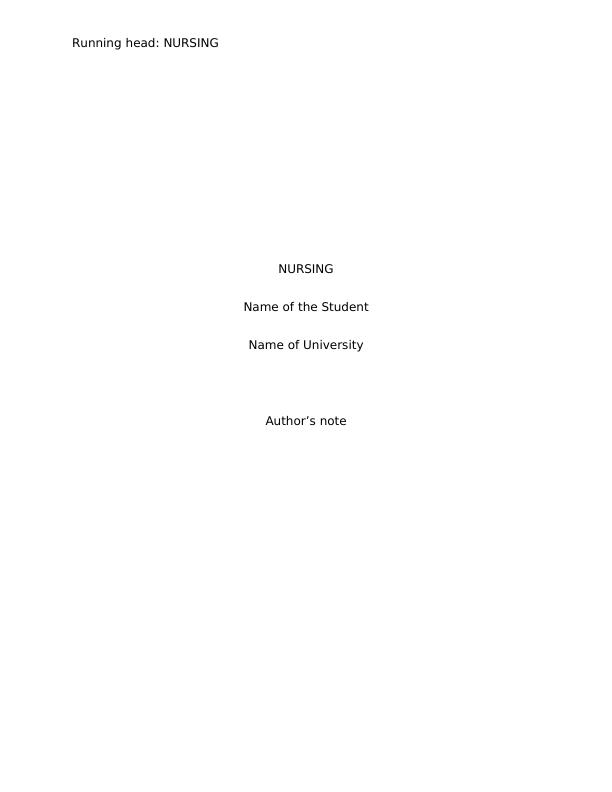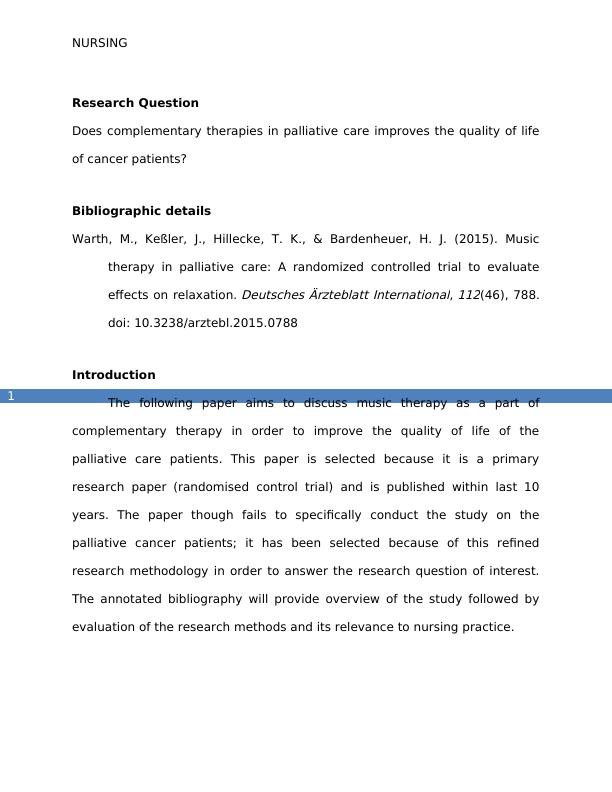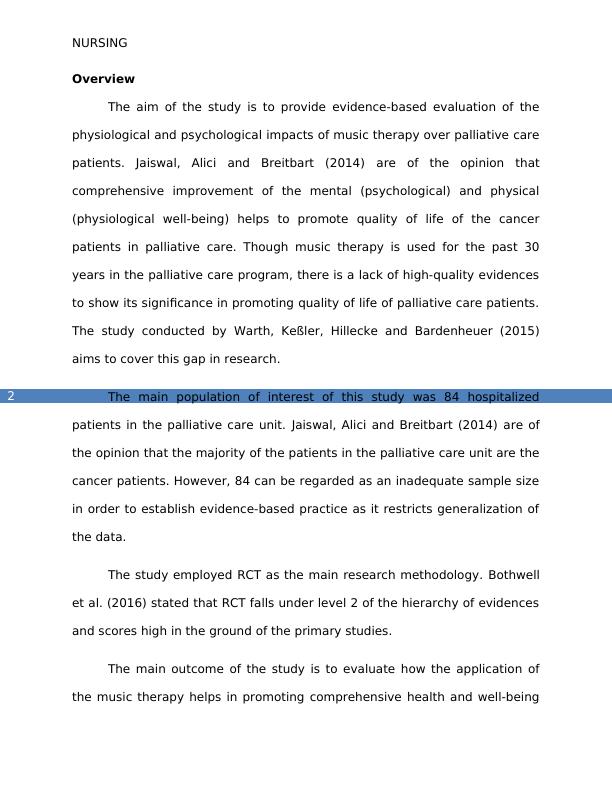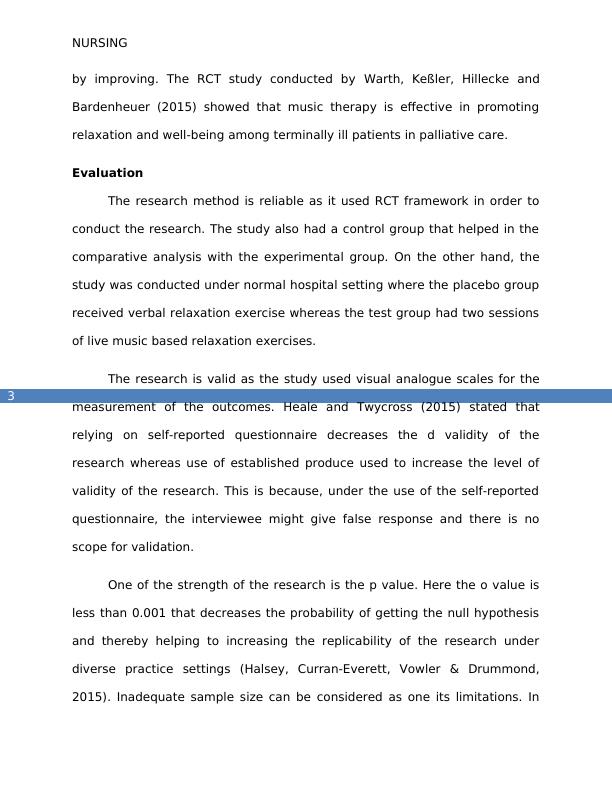Music therapy in palliative care: A randomized controlled trial to evaluate effects on relaxation
Added on 2022-10-14
13 Pages2361 Words95 Views
Running head: NURSING
NURSING
Name of the Student
Name of University
Author’s note
NURSING
Name of the Student
Name of University
Author’s note

1
NURSING
Research Question
Does complementary therapies in palliative care improves the quality of life
of cancer patients?
Bibliographic details
Warth, M., Keßler, J., Hillecke, T. K., & Bardenheuer, H. J. (2015). Music
therapy in palliative care: A randomized controlled trial to evaluate
effects on relaxation.
Deutsches Ärzteblatt International,
112(46), 788.
doi: 10.3238/arztebl.2015.0788
Introduction
The following paper aims to discuss music therapy as a part of
complementary therapy in order to improve the quality of life of the
palliative care patients. This paper is selected because it is a primary
research paper (randomised control trial) and is published within last 10
years. The paper though fails to specifically conduct the study on the
palliative cancer patients; it has been selected because of this refined
research methodology in order to answer the research question of interest.
The annotated bibliography will provide overview of the study followed by
evaluation of the research methods and its relevance to nursing practice.
NURSING
Research Question
Does complementary therapies in palliative care improves the quality of life
of cancer patients?
Bibliographic details
Warth, M., Keßler, J., Hillecke, T. K., & Bardenheuer, H. J. (2015). Music
therapy in palliative care: A randomized controlled trial to evaluate
effects on relaxation.
Deutsches Ärzteblatt International,
112(46), 788.
doi: 10.3238/arztebl.2015.0788
Introduction
The following paper aims to discuss music therapy as a part of
complementary therapy in order to improve the quality of life of the
palliative care patients. This paper is selected because it is a primary
research paper (randomised control trial) and is published within last 10
years. The paper though fails to specifically conduct the study on the
palliative cancer patients; it has been selected because of this refined
research methodology in order to answer the research question of interest.
The annotated bibliography will provide overview of the study followed by
evaluation of the research methods and its relevance to nursing practice.

2
NURSING
Overview
The aim of the study is to provide evidence-based evaluation of the
physiological and psychological impacts of music therapy over palliative care
patients. Jaiswal, Alici and Breitbart (2014) are of the opinion that
comprehensive improvement of the mental (psychological) and physical
(physiological well-being) helps to promote quality of life of the cancer
patients in palliative care. Though music therapy is used for the past 30
years in the palliative care program, there is a lack of high-quality evidences
to show its significance in promoting quality of life of palliative care patients.
The study conducted by Warth, Keßler, Hillecke and Bardenheuer (2015)
aims to cover this gap in research.
The main population of interest of this study was 84 hospitalized
patients in the palliative care unit. Jaiswal, Alici and Breitbart (2014) are of
the opinion that the majority of the patients in the palliative care unit are the
cancer patients. However, 84 can be regarded as an inadequate sample size
in order to establish evidence-based practice as it restricts generalization of
the data.
The study employed RCT as the main research methodology. Bothwell
et al. (2016) stated that RCT falls under level 2 of the hierarchy of evidences
and scores high in the ground of the primary studies.
The main outcome of the study is to evaluate how the application of
the music therapy helps in promoting comprehensive health and well-being
NURSING
Overview
The aim of the study is to provide evidence-based evaluation of the
physiological and psychological impacts of music therapy over palliative care
patients. Jaiswal, Alici and Breitbart (2014) are of the opinion that
comprehensive improvement of the mental (psychological) and physical
(physiological well-being) helps to promote quality of life of the cancer
patients in palliative care. Though music therapy is used for the past 30
years in the palliative care program, there is a lack of high-quality evidences
to show its significance in promoting quality of life of palliative care patients.
The study conducted by Warth, Keßler, Hillecke and Bardenheuer (2015)
aims to cover this gap in research.
The main population of interest of this study was 84 hospitalized
patients in the palliative care unit. Jaiswal, Alici and Breitbart (2014) are of
the opinion that the majority of the patients in the palliative care unit are the
cancer patients. However, 84 can be regarded as an inadequate sample size
in order to establish evidence-based practice as it restricts generalization of
the data.
The study employed RCT as the main research methodology. Bothwell
et al. (2016) stated that RCT falls under level 2 of the hierarchy of evidences
and scores high in the ground of the primary studies.
The main outcome of the study is to evaluate how the application of
the music therapy helps in promoting comprehensive health and well-being

3
NURSING
by improving. The RCT study conducted by Warth, Keßler, Hillecke and
Bardenheuer (2015) showed that music therapy is effective in promoting
relaxation and well-being among terminally ill patients in palliative care.
Evaluation
The research method is reliable as it used RCT framework in order to
conduct the research. The study also had a control group that helped in the
comparative analysis with the experimental group. On the other hand, the
study was conducted under normal hospital setting where the placebo group
received verbal relaxation exercise whereas the test group had two sessions
of live music based relaxation exercises.
The research is valid as the study used visual analogue scales for the
measurement of the outcomes. Heale and Twycross (2015) stated that
relying on self-reported questionnaire decreases the d validity of the
research whereas use of established produce used to increase the level of
validity of the research. This is because, under the use of the self-reported
questionnaire, the interviewee might give false response and there is no
scope for validation.
One of the strength of the research is the p value. Here the o value is
less than 0.001 that decreases the probability of getting the null hypothesis
and thereby helping to increasing the replicability of the research under
diverse practice settings (Halsey, Curran-Everett, Vowler & Drummond,
2015). Inadequate sample size can be considered as one its limitations. In
NURSING
by improving. The RCT study conducted by Warth, Keßler, Hillecke and
Bardenheuer (2015) showed that music therapy is effective in promoting
relaxation and well-being among terminally ill patients in palliative care.
Evaluation
The research method is reliable as it used RCT framework in order to
conduct the research. The study also had a control group that helped in the
comparative analysis with the experimental group. On the other hand, the
study was conducted under normal hospital setting where the placebo group
received verbal relaxation exercise whereas the test group had two sessions
of live music based relaxation exercises.
The research is valid as the study used visual analogue scales for the
measurement of the outcomes. Heale and Twycross (2015) stated that
relying on self-reported questionnaire decreases the d validity of the
research whereas use of established produce used to increase the level of
validity of the research. This is because, under the use of the self-reported
questionnaire, the interviewee might give false response and there is no
scope for validation.
One of the strength of the research is the p value. Here the o value is
less than 0.001 that decreases the probability of getting the null hypothesis
and thereby helping to increasing the replicability of the research under
diverse practice settings (Halsey, Curran-Everett, Vowler & Drummond,
2015). Inadequate sample size can be considered as one its limitations. In

End of preview
Want to access all the pages? Upload your documents or become a member.
Related Documents
Usefulness of Music Therapy- Nursing Assignmentlg...
|6
|1279
|270
NSM5RFN Research Foundationslg...
|8
|2861
|27
Effectiveness of Exercise Intervention on Breast Cancer Survivors Undergoing Aromatase Inhibitor Therapylg...
|26
|4411
|54
Psychological Support for Palliative Care Patients: An Annotated Bibliographylg...
|13
|2540
|219
Evidence Based Nursing Research: Yoga in Cancerlg...
|15
|3854
|359
Research on Health Care 2022lg...
|7
|1560
|21
